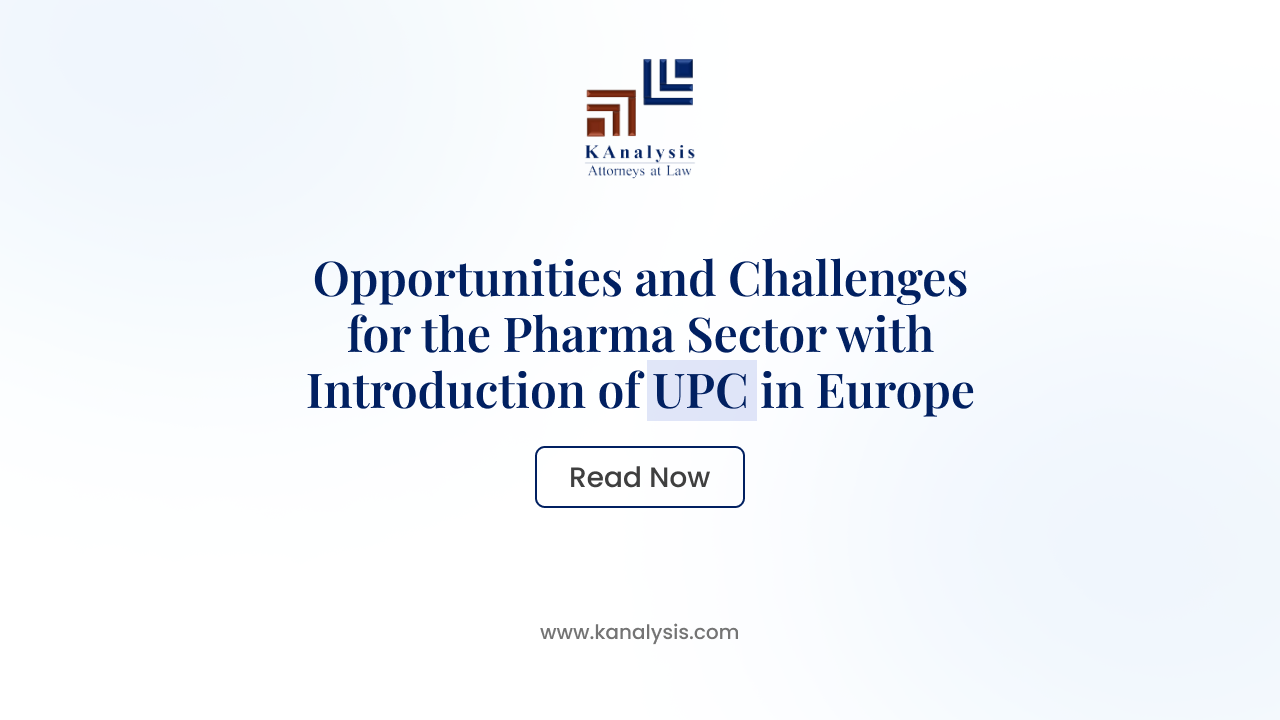INTRODUCTION
The creation of the European Patent Office in accordance with the 1973 European Patent Convention, Europe is poised to see one of the most important advances in the field of patent law. With the introduction of Unitary Patent and Unified Patent Court (UPC). The UPC will have the authority to resolve disagreements on the validity and patent infringement for all participating nations. The UPC will represent the most significant revision to the current European patent framework, and the stakes could not be greater. The UPC also offers cost reductions, efficiency, and unique alternatives for enforcement, including the potential for injunctions over all of the Europe.
The sector which is most concerned with this decision of introducing UPC is pharmaceuticals (being one of the most contentious areas of patent litigation) and thus, the impending arrival of Europe’s Unified Patent Court has put pharma counsels on an edge. Further, it also increases the risk of a patent being declared invalid throughout Europe and that poses a significant risk to pharmaceutical sector, whichfrequently depend on a small number of crucial patents.
Thus, this blog covers the opportunities and challenges available to the pharma companies while dealing with the new UPC system in Europe. Before discussing these opportunities and challenges, it is also essential to mention about the problems faced by this sector in the existing system.
PROBLEMS FACED BY THE PHARMA SECTOR IN THE EXISTING SYSTEM
The European Patent Office reviews applications for European patents under the present European patent system. Applications that comply with the standards of the EPC are approved and thereby takes effect in specific EU member states as a bunch of national patents. Challenges to the validity of a European patent is also made before the national courts in each individual nation, with the exception of the EPO opposition procedure, where the legality of all national designations of a European patent may be decided centrally. An individual country approach is required for the filing of infringement lawsuits. The fact that parties frequently litigate various national designations of the same European patent in different nations concurrently and subsequently also participating in the opposition proceedings at the EPO, is thus a distinguishing feature of pharmaceutical patent litigation in Europe. Since courts in various European nations follow different regulations, particularly in regards to evidence and process, it thereby increases the ambiguity and might result in inconsistent rulings across Europe.
Additionally, at the moment, European regulations only enables cross-border permanent injunctions in exceptional situations where a local infringer is equally party to the infringement activity perpetrated by a foreign entity in the other nations. The pharmaceutical industry is likewise hampered by such tactics. In order to address some of these problems, the unitary patent and the UPC proposals have been made.
Let us now discuss various opportunities or advantages that many applicants across Europe and specifically pharms sector can expect from the mandate of UPC.
OPPORTUNITIES AVAILABLE FOR THE PHARMA SECTOR
Pharmaceutical patent cases frequently involve greater value and at the same time having fierce competition and more technical ambiguity with a wider coverage across Europe. Thereby, the question arises that what opportunities does UPC provides in this space:
1. Litigation Coverage: A Unified Patent Court will have jurisdiction over all European patents which are designated to participating EU Member States and have also ratified the UPC Agreement (except Spain, Croatia, Poland and U.K) unless they choose to opt-out.
The UPC will have the ability to stay litigation concerning a European patent if a decision on the validity of that patent is expected imminently from the EPO. Also, revocation and infringement actions will be staples of UPC’s diet, also covering actions for pronouncing non-infringement.
2. Enforcement Actions: Pharma companies will be quiet keen towards UPC’s potential to grant preliminary injunctions throughout Europe to prevent infringement from occurring. This will definitely be a great opportunity for the patent holders. The UPC will also have the authority to issue other provisional measures, such as orders for the seizure of evidence as well as to issue final relief in terms of damages and permanent injunctions. Administrative decisions of the EPO, such as final ruling on demand for unitary effect when applying for grant, can also be challenged here.
3. Supplementary Protection Certificates: The unitary patent will certainly include unitary Supplementary protection Certificate (SPC) whose main purpose is to mitigate the loss of patent protection for pharmaceuticals industry, that can be caused due to lengthy clinical trials and mandatory testing needed before acquiring regulatory marketing approval. An SPC can only be used to increase a patent right for a maximum of 5 years.
As a first instance, the UPC may allow the validity or infringement of SPC’s throughout Europe to be challenged in a single stroke. Certainly, because SPC protection is typically based on a patent which is essential to the protection of the pharmaceutical product, owners of SPC’s based on the current European patents will surely look to opt out of the UPC system.
4. Procedural Opportunity: In terms of procedural features, the UPC system combines elements from both civil law and common law national systems. Going through the Rules of Procedure, pharma companies may form a perception that the UPC system has the ability to provide a more detailed examination of the facts of a case than conventional civil law system.
With its own Rules of Procedure, UPC will incorporate and take into consideration elements of patent court functioning from various European nations. More thorough hearing of the oral arguments throughout the day will certainly give a hope to the litigants that they will get a speedy resolution with respect to either validity or infringement.
5. Cost Effective: The UPC is expected to decrease the duration and cost of patent litigation proceedings in Europe by avoiding the requirement for parallel litigation. In line with this new framework, the pharmaceutical industry will be able to claim action for infringement across Europe centrally and obtain final injunctions in a single action.
CHALLENGES FACED BY THE PHARMA SECTOR
Though there are many benefits of the UPC but the question appears that are those benefits as good as they appear? The new UPC system, hence has various implications and challenges for the pharma industry:
1. Enforcing Compensation: According to the rules, a valid applicant may be also required to provide security to cover damages in case the permanent injunction is later determined to be unjustified due to the fact that either the patent is invalid or there is no infringement. One of the reservations of the newer system is that in case of ex-parte, what will be the extent to which a patent owner may be able to enforce the permanent injunction selectively in this condition, choosing only certain markets (since some nations have not ratified UPC agreement) in which to restrict the competitor.
2. Revocation: Despite the fact that the UPC system offers a simpler, more affordable procedure, if an EU patent is granted for a pharmaceutical product through the UPC, it would offer patent protection across all member states and allow them to obtain a pan-EU interim injunction should an infringement occur. Currently, it takes separate measures in each relevant nation to challenge or enforce EU patents on a national level. On the other hand, the UPC system may restrict patent protection across all of the EU member states if a patent application is rejected or cancelled.
3. Injunction Gap: Issues had been raised, in specific pointing towards the injunction gap which states that if a counterclaim for revocation is transferred by the local or regional division, the infringement proceedings may still continue and hence will lead to grant of a final injunction before examining the patent’s validity, as a result causing everlasting damage to the infringer.
4. Administrative Challenges: There is a negative apprehension in the pharma industry about the opt-out system under UPC. Thus, it is very crucial that the opt-out administration needs to be uncomplicated and dependable which thereby requires sufficient support from the UPC.
CONCLUSION
Throughout Europe, the UPC has the ability to become an appealing choice for fast enforcement or revocation of patents. It includes various procedural tools that are most probably going to be more useful to the targeted litigants than those accessible under some national procedures. The preliminary complexities about such unestablished legal system will be resolved with time as various precedents appears.
The requirement for establishing different precedents in favor of pharma industry is one reason to be part of this system. For instance, tuning of interests on a permanent injunction application as not same in the pharma sector in relation to other high-tech sectors. Pharma companies must actively engage in the system from the start if they want some solid and reliable decisions in the coming time. Patent holders can also take a lesson from history, which shows that all new courts are in most occasions towards patentee’s side in their first few years.
Subscribe to our monthly newsletter here and read all our blogs here

